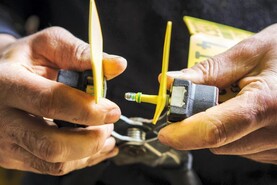DAERA to issue balance payments next week
Balance payments worth 30% of CAP payment claims are to be issued by DAERA from Monday 3 December.
The first payments should reach bank accounts from next Thursday and will continue to be issued daily throughout the month of December. Full payments for farmers that were not in receipt of a 70% advance payment, and have since had their claim verified by DAERA, will also be issued from Monday.
NICMS article correction
An article on a new tranche of the Environmental Farming Scheme on page four of last week’s NI edition was incorrect when it stated that all remaining NICMS agreements expire at the end of 2018.
There are 512 agreements ending at the end of this year, but a further 72 agreements do not expire until the end of 2019.
The article also said that there will be no area-based agri environment scheme on non-designated land in NI after NICMS finishes.
We can clarify that some specific EFS wider-level measures are area based, and EFS higher level can apply to certain habitats on non-designated land.
Markethill raises money for Children’s Hospice
Markethill Livestock Mart raised an exceptional £39,218 for the Northern Ireland Children’s Hospice on Thursday evening last week.
The mart held its annual charity auction as part of its Christmas show and sale, with both events being well supported by the farming community.
Included in the items donated by local farmers and businesses were two Limousin weanlings, a Charolais heifer and Angus calves.
In addition to the money raised through the sale auction, the mart staff also kindly donated their wages for the evening.
Factories increase lamb weights
Lamb processors have raised the carcase weight limit from 21kg to 22kg earlier this week, increasing the value of fat lambs being slaughtered from Monday.
While the revised weight limit now applies to everyone, there have been some larger specialist lamb finishers who have been paid to the higher 22kg limit for some weeks.
Meanwhile, factory prices continue to rise. Base quotes increased by 10p-15p/kg to 395p/kg mid-week, although most farmers report that 400p/kg is widely available.
The increase in base price comes as lamb numbers tighten and demand grows in the run-up to Christmas.
Prices at southern Irish plants are also increasing, adding competition to the live trade, where heavy fleshed lambs finished on meal were making £86-£88 earlier this week.
RUAS beef and lamb championships
The inaugural RUAS beef and lamb championships were held on Tuesday, and the organisers report a successful event for livestock exhibitors.
The main attraction at the event was the longstanding annual Allams fatstock show and sale. A packed sale ring saw the top price of £5,400 paid for a Limousin heifer weighing 550kg from Robert Millar, Moneymore.
The prize-winning animal was purchased by HG Perkins, Hayward Farms, Bath. The same buyer also purchased a 650kg Limousin heifer also offered by Robert Millar, this time paying £4,950
MPI rises to 27.31p/l
The latest milk price indicator (MPI) from the Ulster Farmers Union has recorded a 0.46p/l increase, driven mainly by movements in exchange rate between sterling and euro.
The index now stands at 27.31p/l and is the first increase in MPI since September. Allowing for a processor margin and transport costs, the current MPI would equate to a farmgate price of 25p-26p/l.
At this week’s Dutch Dairy Board auction, there was a mixed outcome. Milk powders were unchanged in price, with skim sold at €1,620/t and WMP making €2,650/t.
The value of skim powder has hardened as expectations are that all remaining intervention stocks will be cleared by the end of March 2019.
However, butter prices eased by €70 to €4,180/t.
MPs want ag bill amended
Amendments to the UK government’s agriculture bill have been proposed by MPs on the Environment, Food and Rural Affairs (EFRA) committee.
In a report published on Tuesday, the MPs state that the UK government should outline a long-term financial commitment to post-Brexit agricultural policy in the UK. The EFRA committee wants the bill amended to include a “multiannual financial framework” for UK agriculture.
The MPs also want a commitment in primary legislation to stop imports of lower-quality food products coming into the UK after Brexit.
“The government should put its money where its mouth is and accept an amendment to the agriculture bill stipulating that food products imported as part of any future trade deal should meet or exceed British standards relating to production, animal welfare and the environment,” the report reads.
Non-vets to prepare export certs
The process of preparing export health certificates is set to change in UK after Brexit, due to workload pressures on government vets.
Health certificates are required to accompany exports of animal products, with the paperwork prepared and signed by qualified vets.
However, speaking at a parliamentary sub-committee on Wednesday, Defra permanent secretary Clare Moriarty said that plans are in place for other government officials to prepare certificates and vets will only be needed to sign them off.
“It’s about looking at which parts of the process can be done by a vet and which can be done by someone else with the appropriate training. That training is being developed and rolled out now,” she told MPs.






 This is a subscriber-only article
This is a subscriber-only article









SHARING OPTIONS: